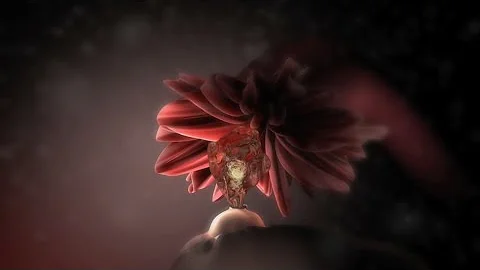What does ovulation mean?
Table des matières
- What does ovulation mean?
- How long after period does ovulation occur?
- What are ovulation symptoms?
- What happens after you ovulate?
- How many hours does ovulation last?
- Can I get pregnant 2 days after my period?
- Can I get pregnant 7 days before my period?
- How many days after period is safe?
- Can you conceive 2 days after ovulation?
- Can you get pregnant 2 days after ovulation?
- How to tell when a woman is ovulating?
- How do you calculate ovulation?
- When is the right time to take an ovulation test?
- How to know when you're ovulating?

What does ovulation mean?
Ovulation is the release of an egg from one of the ovaries. It often happens about midway through the menstrual cycle, although the exact timing may vary. In preparation for ovulation, the lining of the uterus, or endometrium, thickens. The pituitary gland in the brain stimulates one of the ovaries to release an egg.
How long after period does ovulation occur?
Understanding your menstrual cycle Your menstrual cycle begins on the first day of your period and continues up to the first day of your next period. You're most fertile at the time of ovulation (when an egg is released from your ovaries), which usually occurs 12 to 14 days before your next period starts.
What are ovulation symptoms?
Ovulation Symptoms
- Cervical mucus changes. Cervical mucus changes are one ovulation symptom you may experience. ...
- Heightened senses. ...
- Breast soreness or tenderness. ...
- Mild pelvic or lower abdominal pain. ...
- Light spotting or discharge. ...
- Libido changes. ...
- Changes in the cervix. ...
- Nausea and headaches.
What happens after you ovulate?
After ovulation comes the luteal phase. If pregnancy occurs during this phase, hormones will keep the lining from shedding with a menstrual period. Otherwise, a flow will start around day 28 of the cycle, beginning the next cycle. In short: Ovulation generally occurs in the middle of the menstrual cycle.
How many hours does ovulation last?
Ovulation occurs once a month and lasts for about 24 hours. The egg will die if it's not fertilized within 12 to 24 hours. With this information, you can start tracking your fertile days and improve your chances of conceiving.
Can I get pregnant 2 days after my period?
Yes! Having unprotected sex at any time is risky and can result in pregnancy. Sometimes ovulation — the time when a girl is most likely to become pregnant — can happen within a few days of when your period ends. Also, sperm can fertilize an egg for 72 hours (3 days) after ejaculation.
Can I get pregnant 7 days before my period?
Although it is possible to get pregnant in the days leading up to your period, it isn't likely. You can only get pregnant during a narrow window of five to six days a month. When these fertile days actually occur depends on when you ovulate, or release an egg from your ovary.
How many days after period is safe?
There is no absolutely "safe" time of the month when a woman can have sex without contraception and not risk becoming pregnant. However, there are times in the menstrual cycle when women may be most fertile and are most likely to conceive. The fertile days may last for up to 3-5 days after the end of your period.
Can you conceive 2 days after ovulation?
"Most pregnancies result from sex that happened less than 2 days before ovulation," Manglani says. But you can get pregnant earlier or later. "Sperm can live in fertile cervical mucus for up to 5 days," she says. An egg can live up to 24 hours after ovulation.
Can you get pregnant 2 days after ovulation?
"Most pregnancies result from sex that happened less than 2 days before ovulation," Manglani says. But you can get pregnant earlier or later. "Sperm can live in fertile cervical mucus for up to 5 days," she says. An egg can live up to 24 hours after ovulation.
How to tell when a woman is ovulating?
- Some women know when they are ovulating because they can feel a slight pain in their lower abdomen. Other women may bleed slightly in the middle of their cycle. Typical ovulation symptoms and signs include changes in cervical mucus and a small rise in basal temperature.
How do you calculate ovulation?
- The easiest way to calculate ovulation is to count back 14 days from the day you are supposed to start your next period. Example, if you have a 30 day cycle your body would ovulate roughly on the 16th day of your monthly cycle.
When is the right time to take an ovulation test?
- How Often and When Should I Take an Ovulation Test? The best times to test are between 11 am and 3 pm and 5 pm and 10 pm. If you want to make sure that you catch your LH surge, you may want to test twice a day, once in the earlier time frame and the other in the later time frame. Be sure to check at the same time each day.
How to know when you're ovulating?
- One of the most obvious signs that you’re about to ovulate is a change in cervical mucus. As you approach ovulation, you’ll notice an increase in mucus, which will have a slippery, stretchy quality, almost like egg whites.













